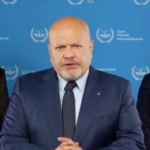Australian Lawyers Warn Federal Ministers their Support of Israel Contravenes International Law

Over 100 Australian and Australia-based lawyers and legal scholars published an open letter on Thursday 22 August 2024, calling on prime minister Anthony Albanese, foreign affairs minister Penny Wong, defence minister Richard Marles and attorney general Mark Dreyfus to implement an arms and energy embargo on Israel.
This is in light of a 19 July 2024 advisory opinion of the International Court of Justice, which finds that Israel’s presence in the occupied Palestinian territories – the West Bank, the Gaza Strip and East Jerusalem – illegal, and that it’s required to remove its occupying force, settlement and settler communities from the region where it is operating an apartheid regime.
“These historic findings by the ICJ do not create new obligations for states,” the local lawyers explain to the politicians, who should be aware of this, as it is. “These obligations have existed for decades, and – regrettably – most states, including Australia, have been in violation of them. Rather, the advisory opinion is a formal, authoritative reminder of these obligations.”
Hopefully, the AG does take heed of this warning, as depending upon the other key ministers to action it could be a stretch as currently Albanese, Wong and Marles have all been charged with complicity in the ICJ ruled “plausible” genocide that’s taking place in Gaza, within a case that was submitted to the International Criminal Court (ICC) by 100-plus Australian lawyers in March.
And 11 months into the Gaza genocide, with the official death toll having surpassed 40,000, and many thousands more deaths yet to be accounted for, the Albanese government now stands nakedly before the public, after having attempted to deny that genocide-facilitating trade with Israel does exist, not only complicit in mass slaughter but contributing to apartheid as well.
Merely fulfilling our obligations
According to the 100 plus legal experts, the obligations that our nation is bound to as a result of these findings include not recognising Israel as encompassing the occupied Palestinian territories, abstaining from treaty relations or diplomatic missions that involve Israel acting on behalf of them, and ending economic, trade or investment relations that contribute to the occupation.
Further requirements that Australia is obligated to take under international humanitarian law are not to aid or assist in the illegal occupation of the Palestinian territories, ensure that the occupation is brought to an end to permit Palestinian self-determination and to contribute to efforts that bind the UN General Assembly and its Security Council to act in accordance with this advice.
“We consider the legal obligations pertaining to trade and investment to be crucial from a legal and practical point of view,” the Australian lawyers warn the Albanese government in their 22 August statement published in Overland.
“Any good-faith interpretation of this obligation involves, at the very least, a comprehensive arms and energy embargo on Israel that covers the export, import and transfer of weapons, including parts, components and other dual-use items, as well as military jet fuel,” the legal professionals make certain.
The lawyers further point to the ICJ’s “detailed exposition of the role of water management, city planning and infrastructure and land policies in Israel’s illegal practices of occupation, racial segregation and annexation”, so, they explain to the top ministers, including the nation’s chief lawmaker, that this means “Australia must urgently suspend” ties related to these areas.
A slightly inadequate response
On the day following the ICJ advice publication, the foreign minister released a statement that didn’t mention it whatsoever, but instead announced that she’d “imposed Magnitsky-style targeted financial sanctions and travel bans on seven Israeli individuals, and targeted financial sanctions on one entity, for involvement in settler violence against Palestinians in the West Bank”.
Magnitsky laws permit governments to place sanctions on specific individuals abroad involved in human rights abuses. So, following the World Court having ordered this nation and all others to halt ties with Israel in relation to its occupation of the Palestinian territories, Wong appears to have responded with a targeted sanction against just seven settlers, after all were called upon to leave.
On Thursday, the local lawyers advised the minister that this was “insufficient”. And due to the fact that Wong must not be able to understand why that is, or her actions would’ve spoken otherwise, the lawyers set out the reason, which is the ICJ found “settler violence in the West Bank is not the aberrational doing of individual extremist settlers”, rather it’s part of Israel’s occupation policy.
“In light of this, the Australian government must impose targeted sanctions, including asset freezes against Israeli individuals and entities involved in Israel’s illegal occupation, settlement enterprise, annexation, persecution, racial segregation and/or apartheid policies,” the legal eagles further advised.
An apartheid state
The Legal Consequences Arising from the Policies and Practices of Israel in the Occupied Palestinian Territory, including East Jerusalem, as the advice is known, is not a response to the wholesale slaughter and starvation project that Israel has been perpetrating in the Gaza Strip since last October, but rather it answers questions put to it in 2022 by the UN General Assembly in resolution A/77/400.
The lawyers further explain that “Israel’s prolonged occupation violates multiple facets of the right to self-determination of Palestinian people, including permanent sovereignty over their natural resources”, which, the court confirmed, is a right that’s “erga omnes and jus cogens in nature”.
An erga omnes matter is one that all states have a legal interest in seeing fulfilled due to what it involves, while jus cogens refers to an international law legal norm.
“The erga omnes and jus cogens nature of this right mean that this is not a bilateral dispute, but rather a multilateral issue with legal ramifications for all states, including Australia,” the lawyers further explain to the prime minister and his colleagues.
But when the resolution to investigate the Israeli occupation of Palestinian territories was adopted on 30 December 2022, the PM and foreign minister had long been aware that the occupation of these territories was in breach of international law, and they’d also been key Labor supporters of recognising the state of Palestine, which was part of Labor’s 2021 and 2023 policy platforms.







